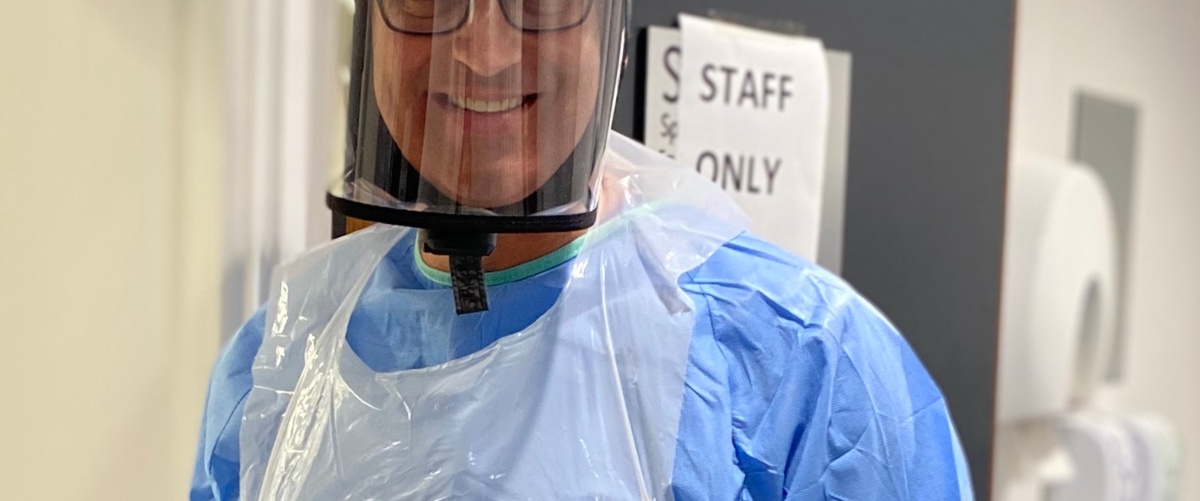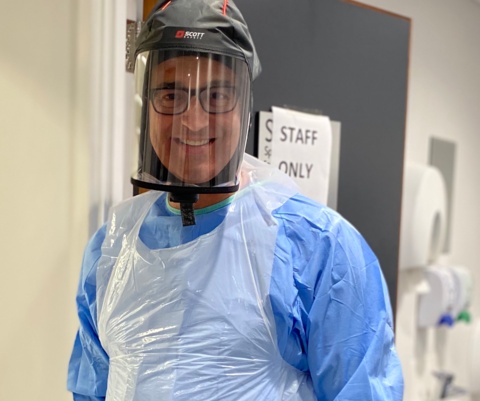As part of ON Takeover week, we are taking a look at where Norwich School took some of our Old Norvicensians...
In the latest ON Magazine, which takes a look at ONs in the world of work, we hear from Consultant Surgeon Martin Wadley (75-84) who tell us what it's been like working at the Worcestershire Royal Hospital during the Covid-19 pandemic and how he wears lucky socks before an operation!
What are you doing now for work?
I am a Consultant Surgeon working in Worcestershire.
After leaving Norwich School in 1984 I qualified in medicine form Sheffield University Medical School in 1990. My training included working at hospitals in Nottingham, London, and Birmingham before being appointed as a Consultant Surgeon to Worcestershire Royal Hospital in 2002.
I work in the field of upper gastrointestinal surgery, treating diseases of the oesophagus, stomach, liver, and biliary system.
My specialist interests are in the treatment of oesophageal and gastric cancer and metabolic and bariatric surgery. I also work in the regional Upper GI Cancer center in Gloucester which provides specialist Upper GI cancer surgery to the 1.4 million population of Worcestershire, Herefordshire, and Gloucestershire.
Explain your company to us.
Worcestershire Acute Hospitals NHS Trust is the major healthcare provider for the 600,00 population of Worcestershire.
What is your greatest professional achievement?
My research doctorate in Cancer Studies (MD) awarded by the University of Birmingham in 2002
What is your motivation?
My patients. They inspire me every day.
What are your greatest challenges?
Balancing scarce resources with demand. An ever-growing problem for modern healthcare, particularly in the NHS.
Oh, and COVID-19, it has changed everything.
Tells us what changes and challenges you have faced to working in a Covid-19 World:
In March 2020 the NHS changed dramatically. We had all been watching the headlines coming from China, Iran, and then Italy. As our concerns grew, we knew by the end of February that it would affect our healthcare in the UK. Most of us underestimated the true impact that was to come.
My wife (also an NHS Consultant) and I travelled to Heathrow on 18th March 2020 to collect our son. His gap year in Australia and South America had been cut short by the impending pandemic.
The next day our hospital cancelled all elective surgery, and we were placed on emergency rotas and shifts to deal with the massive influx of sick and elderly patients over the next few weeks. The number of COVID patients peaked in our hospital on April 18th 2020. Over this period and beyond we all became used to mask wearing, enhanced hand hygiene and social distancing.
Despite the reduction in COVID numbers over the summer, we didn’t return to routine elective operating until October 2020. We utilised private hospital capacity for cancer surgery and set about trying to make our patient pathways COVID secure. Routine twice-weekly COVID tests were introduced for staff in July. All patients being admitted had to have a negative COVID test prior to admission. We separated elective and emergency patients into different parts of the hospital.
The second wave which began in October changed everything. As I write we have nearly double the number of COVID inpatients as we did in the Spring. We saw our peak number of inpatients on January 24th 2021. The numbers are starting to fall but we have a long way to go.
Vaccination for staff started in December 2020. We now vaccinate cancer patients 2 weeks before they are admitted for surgery. But we can’t do this for patients admitted as an emergency. Spread between asymptomatic patients and staff has been a real problem, as has the number of staff off sick with COVID, shielding or isolating due to COVID contacts.
We all feel that vaccination is the key to lifting restrictions and getting the health service back to doing what it has always done. It’s going to be a challenge, but we will get there.
If you could go back in time, what would you tell yourself starting out?
Look after number one!
How have you got to where you are today?
Working hard, playing hard and with a bit of luck. Oh, and with support from family and friends.
If you could offer one piece of business advice to a new start-up company, what would it be?
Aim high.
What is your most memorable work experience?
Working as a medical student at a large hospital in Chennai, India for 3 months in 1988. A life-changing experience.
Who is your inspirational figure?
Too many colleagues to mention. However, my wife has managed a successful career as a Consultant Anaesthetist, raising two children and supporting my career. That puts her at the top of my list.
What couldn’t you work without?
My team. Junior doctors, specialist nurses, psychologists & dieticians. They all play a huge role in what I do day to day.
How do you think Norwich School helped you to get where you are now?
It taught me to aim high and not settle for second best.
What makes Norwich School special to you?
It’s setting. At the heart of a beautiful city, by England’s greatest cathedral.
What is your favorite Norwich School memory?
Sports Day in the early 1980s when School House ruled supreme!
What hobbies/interests do you have outside of work?
Travel, golf, wine, Labradors and family.
What might someone be surprised to know about you?
I always wear lucky socks before a major operation.
Would you be willing to offer career advice or work experience/leadership skills to the Norwich School community?
Absolutely!


